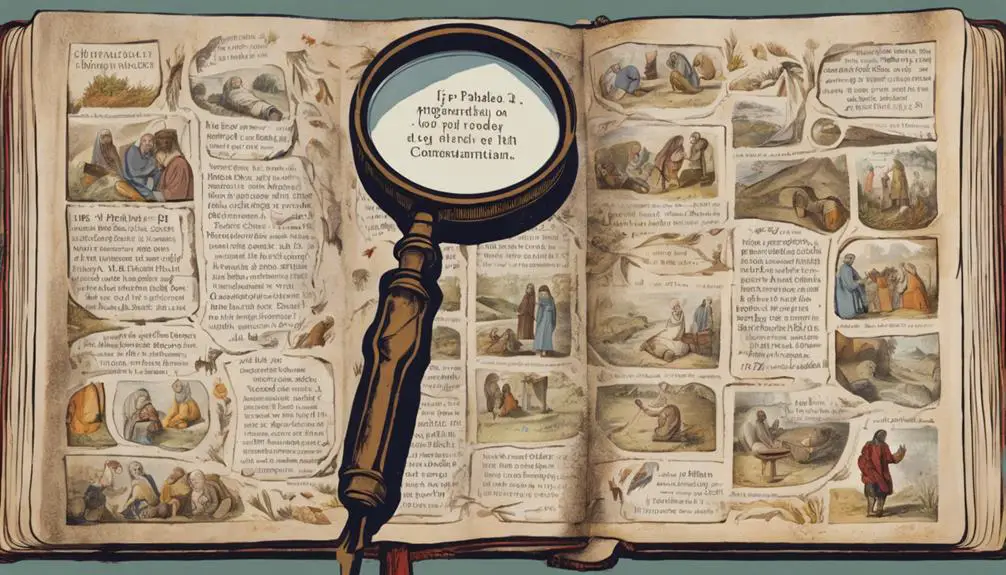Cracking the code of the word 'If' in the Bible may unlock profound theological implications, leaving you astounded by its understated significance.

If Meaning in the Bible
Just as you happened to turn a page in your Bible last night, you might have stumbled upon the word 'If'.
This tiny, yet significant word often appears in biblical texts, from parables to prophecies. It's intriguing how 'If' can condition a promise, an outcome, and even an entire theology.
But, what does 'If' truly mean within these sacred scriptures? Let's ponder on this together, shall we?
You might be surprised, or even shocked, at the profound implications this little word carries.
Key Takeaways
- 'If' in the Bible signifies conditional statements, shaping theological insights and moral lessons.
- In biblical parables, 'if' prompts introspection, self-examination, and spiritual reflection.
- 'If' introduces conditional prophecies, signifying a divine-human partnership in prophecy fulfillment.
- Theological implications of 'if' deepen understanding of God's nature, conditional faith, and divine reciprocity.
Exploring Conditional Statements in the Bible

Diving into the depths of biblical literature, you'll often encounter conditional statements, those 'if-then' passages that offer profound theological insights and implications. These aren't mere literary techniques; they're key components in Biblical Interpretations, revealing God's promises and requirements in the form of Conditional Covenants.
You'll find these statements throughout the Old and New Testaments. They're a divine articulation of conditions – IF you adhere to God's laws, THEN you'll receive His blessings. But it's not as straightforward as it sounds. The 'if' here isn't a mere conditional clause; it's an invitation to free will, denoting our capacity to choose obedience or disobedience.
Let's take Deuteronomy 28, where blessings and curses are explicitly tied to obedience or disobedience. There's a clear 'if-then' structure: IF you obey, THEN you'll be blessed. IF you disobey, THEN you'll be cursed. This isn't a divine ultimatum but an exposition of the relationship between God and humanity, highlighting the consequences of our choices.
In understanding these conditional statements, you're not just exploring textual intricacies, but also the nature of God's love – a love that respects human autonomy, even when it leads to consequences.
The Role of 'If' in Biblical Parables

In examining the role of 'if' in biblical parables, you'll notice its profound significance in shaping the underlying moral and spiritual lessons. 'If' interpretations provide a depth of understanding that allows you to uncover the rich theological implications embedded within these narratives.
Consider the Parable of the Sower. The phrase, 'if a seed falls on good soil' isn't merely a conditional statement; it's an invitation to introspection. The 'if' clause triggers a call to self-examination, asking you to consider the condition of your 'spiritual soil.'
Through parable analysis, it's clear that 'if' is a tool used by the biblical authors to create multi-layered narratives. Each 'if' presents an alternate reality, a possible outcome that pivots on the choices and heart-conditions of the characters. This, in turn, prompts you, the reader, to reflect on your own spiritual state and choices.
The 'if' in biblical parables serves not just to create a hypothetical scenario, but a spiritual mirror. It compels you to confront your own faith journey, making the biblical text more than just an ancient manuscript, but a living, breathing guide to spiritual growth.
If' in the Context of Biblical Prophecies

Just as 'if' plays a pivotal role in biblical parables, its function within biblical prophecies also carries profound implications, opening up a world of potential outcomes based on human responses to divine directives. You'll find that 'if' introduces Conditional Prophecies, where fulfillment relies on the actions of humans.
In a Prophetic Interpretation, 'if' can be seen as a divine invitation to participate in God's plan. It's not a mere prediction; it's a call to action. It propels you into a dynamic relationship with the divine, where your actions shape the prophecy's outcome.
Consider Jeremiah 18:7-10, God declares He'll relent from disaster 'if' a nation turns from evil. But 'if' it does evil, God will reconsider the good intended. Here, 'if' denotes a conditional prophecy, predicated on human action. It signifies a divine-human partnership in fulfilling or averting prophecy.
Understanding Theology Through 'If

Exploring theology through the lens of 'if' can deepen your understanding of God's nature and His relationship with humanity. This small but powerful word is a prism that refracts divine complexity into comprehensible facets. It's a gateway to the vast theological implications that shape our faith.
When you grasp the conditional aspect of 'if', you're introduced to the concept of conditional faith. This means that our faith isn't merely a static state of belief, but a dynamic journey contingent on our actions and decisions. It's an invitation to engage with God on a deeper level, to explore the 'ifs' and 'buts' of our spiritual journey.
The 'if' in theology also underscores the idea of divine reciprocity. The rewards or consequences of our faith aren't arbitrary; they're conditional, hinged on the 'if'. God's promises are predicated on our response to His call, our willingness to obey, and our perseverance in faith.
Case Studies: 'If' in Biblical Verses

Now, let's turn our attention to specific instances in the Bible where the word 'if' plays a significant role, informing and shaping our theological understanding. Consider the use of 'if' in Psalms, a book filled with beautiful poetry and heartfelt prayers. Psalm 32:10 states, 'Many sorrows shall be to the wicked, but he who trusts in the Lord, mercy shall surround him.' Here, 'if' is implied, suggesting that if one trusts in the Lord, mercy will envelop them, a potent theological statement about divine protection and grace.
Now, pivot to Genesis, the Bible's first book. In Genesis 4:7, God says to Cain, 'If you do well, will you not be accepted? And if you don't do well, sin lies at the door.' Here, 'if' acts as a hinge between human action and divine response, highlighting the profound theological concept of sin and its consequences.
In both instances, 'if' enables a deeper understanding of God's character and the relationship between divine and human actions. These case studies illustrate how 'if' isn't just a conjunction, but a theological tool in Biblical exegesis.
Frequently Asked Questions
How Is the Word 'If' Used in Different Versions of the Bible?
You'll find 'if' used in different versions of the Bible to express conditional promises and in parables. It sets conditions for blessings or consequences, often signaling a covenant between God and people.
In parables, 'if' often initiates hypothetical scenarios, illustrating spiritual truths. It's crucial to consider the context, language, and the specific translation you're reading to fully grasp the depth of 'if's usage. Understanding this can enrich your biblical interpretation.
Is There a Difference in the Interpretation of 'If' in the Old Testament Versus the New Testament?
When you're looking at 'if' connotations in the Old and New Testaments, you'll find differences. The Old Testament often uses 'if' in relation to Biblical conditions for Israel's covenant with God.
In the New Testament, 'if' is frequently tied to the conditions of salvation and faith in Jesus Christ.
Are There Any Controversies or Debates Among Theologians Regarding the Use of 'If' in the Bible?
Yes, there are debates among theologians regarding 'if' in the Bible, especially in parables and conditional promises.
Some argue 'if' signifies a condition to God's promises, implying human responsibility. Others believe 'if' is used for hypothetical scenarios, not literal conditions.
These interpretations often hinge on theological views about free will and predestination. It's a complex issue, requiring careful analysis and consideration of the original languages and contexts.
How Does the Use of 'If' in the Bible Compare to Its Usage in Other Religious Texts?
When you compare the use of 'if' in the Bible to its usage in the Quran or Vedas, you'll find some differences.
In the Quran, 'if' often introduces hypothetical situations or divine conditions.
In the Vedas, 'if' frequently appears in ritualistic contexts, invoking conditions for performing certain rites.
Each usage reflects unique theological views within these religious texts, demonstrating the flexibility and varied interpretations of 'if'.
How Can Understanding the Use of 'If' in the Bible Enhance Personal Bible Studies or Devotions?
Understanding 'if' in parables and conditional promises can greatly enhance your Bible studies. It'll help you grasp the conditions under which promises were made, deepening your understanding of biblical texts.
It can also bring clarity to parables, as the 'if' often signifies a spiritual condition or requirement for a promised outcome. This detailed analysis can lead to a more theological understanding of Scripture, enriching your personal devotions.
Conclusion
In conclusion, the term 'if' plays an integral role in the Bible, often serving as a turning point in parables, prophecies, and theological statements. It sets the stage for conditions that must be met, revealing profound insights into God's nature and the human response.
By examining 'if' in various Biblical verses, you've deepened your understanding of Scripture's complexity and richness. Be encouraged to continue exploring the Bible with this analytical lens.



Sign up